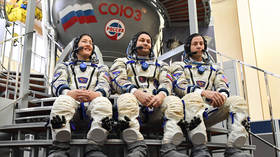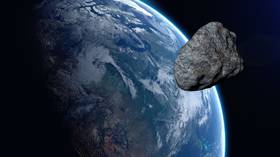As reliance on Russia’s Soyuz spacecraft ends, NASA set to reduce cooperation with Moscow’s Roscosmos

Since the launch of the International Space Station in 1998, Roscosmos and NASA have worked together to service the most famous man-made satellite. Now, the latter is considering reducing its representation in Russia.
That’s according to news agency RIA Novosti, citing a source in the rocket and space industry.
As things stand, NASA has employees stationed in Russia’s Cosmonaut Training Center near Moscow, as well at the Mission Control Center and the Institute of Biomedical Problems.
Also on rt.com Foes on the ground, but friends in space: American astronauts on ISS give their food to Russian cosmonauts after supplies run outAccording to RIA’s source, the majority of cuts are expected at the Cosmonaut Training Center, due to the “termination of regular flights of American astronauts on Russian Soyuz spacecraft.” From 2011 to 2020, the US was reliant on Russia’s Soyuz spacecraft as the only means for Americans to reach the International Space Station (ISS). Last year, Elon Musk’s SpaceX Crew Dragon allowed the US to find its own way to the satellite, meaning NASA is no longer dependent on Soyuz.
The Cosmonaut Training Center is located in Star City and is home to much of Russia’s space-focused military research. The cuts are unlikely to affect the US’ presence in the ISS Mission Control Center.
Officially, Roscosmos is yet to receive notification of NASA’s intent to reduce its personnel stationed in the country.
Earlier this week, it was revealed that Russian astronauts on the ISS were helped out by their American counterparts after their food store ran low. Following the postponement of a planned shipment, NASA offered up its rations.
Last year, Roscosmos indicated that it may launch its own orbital station after 2024. The ISS is expected to operate until 2030, but Moscow believes that it is deteriorating faster than expected and may need to be replaced much sooner.
Think your friends would be interested? Share this story!














